MercoPress. South Atlantic News Agency
Environment
-
Thursday, November 29th 2018 - 06:35 UTC
King steer Knickers size has proved to be his saving grace
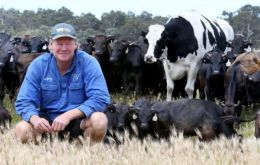
Knickers looms above the thousands of other cattle that he feeds with in rural Western Australia. At some 1,400kg (220st) and 194cm (6ft 4in), the seven-year-old is believed to be the biggest steer in a country home to millions of cattle. And his size has proved to be his saving grace.
-
Monday, November 26th 2018 - 07:40 UTC
New Zealand reports the death of some 145 pilot whales stranded in a beach
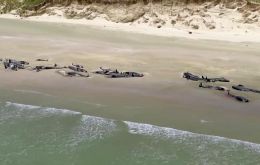
Like it happened in the Falkland Islands earlier in the month a group of up to 145 pilot whales have died after becoming stranded on a beach on Stewart Island in New Zealand. The animals were discovered by walkers late on Saturday, strewn along the beach of Mason Bay.
-
Saturday, November 24th 2018 - 09:10 UTC
Deforestation in the Amazon rainforest reaches highest level in a decade

The destruction of Brazil's Amazon rainforest reached its highest level in a decade this year, government data released on Friday showed, driven by illegal logging and the encroachment of agriculture in the jungle.
-
Friday, November 23rd 2018 - 04:31 UTC
Falklands' Pebble Island turns into death trap for 56 beached pilot whales
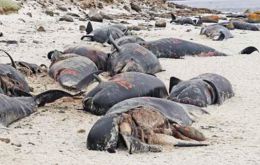
Fifty six whales died after beaching at Pebble Island approximately five days before they were spotted on November 10 by a Falkland Islands Government Air Service (FIGAS) pilot.
-
Thursday, November 22nd 2018 - 08:36 UTC
Australia dust storm shrouds Sydney and reduces visibility to meters; air quality hazardous

A dust storm that has swept across drought-stricken parts of New South Wales in Australia has shrouded Sydney's landmarks and sparked an air quality warning from the State Government. The dust storm, which stretches about 500 kilometers, reduced visibility to just meters in far western NSW including at Darling River and Broken Hill.
-
Thursday, November 22nd 2018 - 08:30 UTC
UN Environment chief resigned (sacked) over global travel expenses

U.N. environment chief Erik Solheim resigned following widespread criticism of his excessive expenses on official global travel. The former Norwegian diplomat, politician and environment minister announced on the U.N. Environment Program's website that he would step down on Thursday after receiving the final report of the audit of his official travel by the U.N.'s internal watchdog on Saturday.
-
Wednesday, November 21st 2018 - 09:24 UTC
Thousands evacuated from areas around Guatemalan Fuego volcano
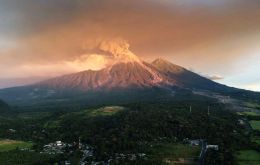
Almost 4 000 people were evacuated from areas around Guatemala’s Fuego volcano, which began violently erupting on Monday, the country’s disaster agency Conred said.
-
Wednesday, November 21st 2018 - 08:38 UTC
Dead sperm whale in Indonesia had kilos of plastic waste in its stomach

A sperm whale found dead in a national park in Indonesia had nearly 6kg of plastic waste, including 115 cups, in its stomach, park officials said on Tuesday. The 9.5m whale was found in waters near Kapota Island, part of the Wakatobi National Park, southeast of Sulawesi, the park said in a statement.
-
Monday, November 19th 2018 - 09:05 UTC
California inferno: 80 dead, 1,200 missing, 13.000 home turned into dust
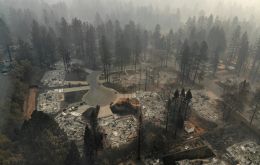
The number of people who remain missing in the wake of a pair of ferocious wildfires that have been blazing across both ends of California for more than a week spiked to more than 1,200 late Saturday.
-
Monday, November 19th 2018 - 07:20 UTC
Argentina/UK/Falklands' South Atlantic fisheries joint scientific cruises closer

London hosted the biannual meeting of the South Atlantic Fisheries Scientific Sub Committee which took place November 14/15 with the participation of officials and scientists from Argentina and the UK, and from the Falkland Islands.
